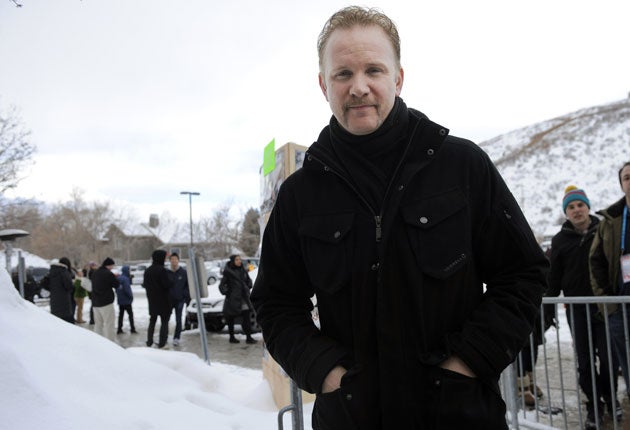Spurlock causes stir at Sundance over product placement

Your support helps us to tell the story
From reproductive rights to climate change to Big Tech, The Independent is on the ground when the story is developing. Whether it's investigating the financials of Elon Musk's pro-Trump PAC or producing our latest documentary, 'The A Word', which shines a light on the American women fighting for reproductive rights, we know how important it is to parse out the facts from the messaging.
At such a critical moment in US history, we need reporters on the ground. Your donation allows us to keep sending journalists to speak to both sides of the story.
The Independent is trusted by Americans across the entire political spectrum. And unlike many other quality news outlets, we choose not to lock Americans out of our reporting and analysis with paywalls. We believe quality journalism should be available to everyone, paid for by those who can afford it.
Your support makes all the difference.He found fame baiting America's most famous brand – but in his latest film Morgan Spurlock has decided to embrace the corporate world.
The director who gorged on fast food in Supersize Me premiered his new film, The Greatest Movie Ever Sold, at the Sundance Film Festival in Utah at the weekend. The film shines a light on the dizzying extent of product placement in television and movies, and shows Spurlock asking firms for a fee for name-checking their products, was entirely financed in this way.
Introducing the film to audiences while he was clad in a suit covered with logos from all 15 of his sponsors, Spurlock warned: "This film will ruin film and TV for you for ever. I do hope it will start a conversation related to marketing and advertising."
Spurlock also announced that he had amended its name to Pom Wonderful Presents: The Greatest Movie Ever Sold.
For the uninitiated, Pom Wonderful is a brand of pomegranate juice, and just to hammer the point home, free bottles were being handed out to festival-goers at the premiere.
Just as he investigated the fast-food industry in Super Size Me by gorging himself on McDonald's, Spurlock felt the best way to make his point about branding in the movie industry was to unashamedly seek out companies who would finance his film.
The director takes viewers behind the scenes at his meetings with potential sponsors as they thrash out a deal, providing a fascinating insight at just how blockbusters such as Iron Man and Transformers are tied in with their corporate deals. He told the audience that he and his team had approached about 500 companies, most of whom refused – but that no one would have been off limits. "We tried to get BP on board, because if anyone needs an image makeover at the moment, it's BP," Spurlock said.
Sundance audiences certainly got both the joke and the point behind it, with the movie receiving a warm reception. The trade magazine The Hollywood Reporter called it "funny and entertaining". There were rumours that festival organisers was annoyed that bottles of Pom Wonderful were being handed out; the brand isn't one of their corporate sponsors. If true, they had just unwittingly confirmed Spurlock's point.
Other documentaries are also making waves at Sundance and the British director Kevin Macdonald's Life In A Day is one of the most eagerly awaited. The movie is a 90-minute glimpse of what life is like on Earth, from Australia to Zambia, on a single day. Macdonald, best known for the mountaineering drama-documentary Touching The Void, received 80,000 submissions from the public via YouTube after pleading for entries through the Sundance Institute. The day in question was 24 July, 2010. The result is billed as " an unique cinematic experience, in beautiful and harrowing honesty, of what it is to be alive."
Another British documentary also gathering strong reviews was Project Nim. In it James Marsh, the director of the award-winning Man On Wire, turned his attention to a 1973 scientific experiment which examined what would happen if a chimpanzee, Nim, was only raised by humans for the first five years of his life. It was hoped that the chimp would learn enough language to be able to communicate his feelings – and forever break down the barriers between humans and our nearest relative.
The experiment didn't pan out; this is the story of Nim and what happened to him. In Marsh's own words, the experiment was "profoundly upsetting".
Join our commenting forum
Join thought-provoking conversations, follow other Independent readers and see their replies
Comments